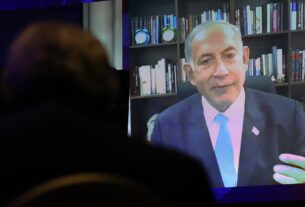Walking and chewing gum. Nixon and China. Fighting against the British in Palestine while fighting with the British in Europe.
All are cliches signifying two seemingly contradictory actions that are possible — and potentially preferable — to do at the same time. And all were cited this week by Jewish critics of Donald Trump as apt metaphors for what they are doing this week in the wake of Trump’s successful brokering of a ceasefire in the Gaza war.
Jewish Americans are reeling as a president many blame for undermining democracy brokered a deal that appears poised to return the Israeli hostages held by Hamas in Gaza. Unlike many jubilant Israelis, some reliably liberal Jews here are having a hard time praising Trump and his team for the kind of diplomatic breakthrough that his Democratic predecessor couldn’t bring about. But they are largely figuring out how to do it.
“It’s important to recognize that the vast majority of American Jews, just as Israelis, want a return of the hostages, and they want this war to end, and if Donald Trump and his team can help to bring that about, they deserve credit for doing so,” said Halie Soifer, the CEO of the Jewish Democratic Council of America, the leading Democratic group in the community.
Trump in his second term is deeply unpopular with American Jews. Prior to the announcement of a long-awaited ceasefire between Israel and Hamas, his backing for Israel did not dent the disapproval he draws from a demographic that votes overwhelmingly Democratic.
A poll in April found 72% of Jewish voters disapproved of Trump. A robust majority opposed his signature policies, including deportations and retaliating against political enemies. A majority even opposed his efforts to combat antisemitism.
At the same time, Trump also has not hidden his disdain for legacy Jewish groups: The FBI earlier this month cut off all ties with the Anti-Defamation League, and its director, Kash Patel, likened the group’s tracking of right-wing extremists to terrorism.
Abe Foxman, the former ADL CEO, was appalled by Patel’s actions against his former colleagues and campaigned in 2020 for Joe Biden, the Democrat who ousted Trump after his first term. But he said the community should praise Trump for the peace deal, and he was surprised the praise was not more robust.
“The American Jewish community needs to walk and chew gum at the same time. We should be able to differentiate and say, ‘Thank you, Mr. President’ and ‘No thank you, Mr. President,’” Foxman said in an interview. “He did something so many of us yearned for in the last two years, and he made it happen, and Biden didn’t make it happen.”
Rabbi Jonah Pesner, who leads the Reform movement’s advocacy arm, the Religious Action Center, said there was a Jewish ethical obligation to thank Trump, based on the Jewish imperative to publicly “recognize the good,” hakarat hatov, even if the administration does not reciprocate.
“We would look at it through the lens of Jewish learning and Jewish wisdom,” Pesner said. “We have a president who has done exactly what we asked, bring the hostages home, end the war and the suffering in Gaza, both for the sake of the innocent in Gaza, but also for [Israelis], and get back on a path to a sustainable, lasting peace so that both sides can live in peace.”
That does not mean opposition to Trump’s domestic policies should flag, Pesner said, noting the Reform movement’s activism in opposing the deportations and Trump policies targeting transgender people.
“Our people are in the streets in Los Angeles and Chicago, trying to be a human buffer between troops that are being deployed [to arrest undocumented migrants] and the people who will be impacted,” he said.
Pesner’s predecessor at the RAC, Rabbi David Saperstein, said Trump “deserves to be commended for an extraordinary achievement” – but the Trump administration’s strident hostility to groups that might disagree on some issues made it hard to express. (Earlier this month, Trump shared on social media a meme calling Democrats “THE PARTY OF HATE, EVIL, AND SATAN.”)
Saperstein lamented the passing of an era when Jewish organizations would be comfortable working with a president whose policies they mostly opposed. He recalled being present at the White House, as RAC CEO, when President George W. Bush signed RAC-backed bills on human trafficking, on Sudan and on prison rape.
“While we staunchly supported a number of the efforts of the [Bush] administration, both domestically and in terms of Iraq, one always knew that the White House would accept that dichotomy as a norm of how American politics functions, and wouldn’t stop that from working collegially in places we could find common ground,” Saperstein recalled. “This administration is woefully different.”
Joel Rubin, a deputy assistant secretary of state during the Obama administration, drew two historical analogies to explain why Democrats and Jews should more robustly praise Trump on his Mideast diplomacy: Richard Nixon, who brokered peaceful relations with China while under even as he faced investigation for spying on Democrats, and David Ben-Gurion, who in 1939 said Jews in Palestine should resist British oppression with the same dedication they showed in joining the British in fighting Nazis.
“I think it’s been a very, very difficult thing for Democrats to admit that, you know, Nixon went to China on this one,” said Rubin, who in 2020 was the Jewish community liaison for the presidential campaign of Vermont Sen. Bernie Sanders, the de facto leader of progressives.
Trump, Rubin said, was able to do what Biden was not: pressure Israeli Prime Minister Benjamin Netanyahu to defy his far-right coalition partners and make a deal by enticing him with unfettered military and diplomatic support.
“Biden didn’t have the leverage to pressure Bibi [Netanyahu], the way that Trump has the leverage to pressure Bibi.” Biden, he said, “failed to capitalize on the window that he had opened after Oct. 7,” when the Democratic president expressed unalloyed support for Israel. “He kind of sat passive, and he just didn’t know how to do it. And Trump didn’t take any of the recommendations from the ‘pressure Israel’ crowd. He didn’t cut off military aid. In fact, he accelerated it. And that built up huge equity inside the Israeli body politic.”
Jewish political conservatives have been beyond effusive in their praise. The Republican Jewish Coalition has not only called for Trump to win the Nobel Peace Prize, it said the prize should be renamed for Trump.
Jo-Ann Mort, a public relations consultant who has worked with liberal Jewish and non-Jewish groups, said Trump deserved thanks, but the deal was not the game changer that Trump and his acolytes were claiming. Its terms have been on the table since the Biden administration, she said, and keeping the peace in the Middle East has been part of the presidential brief since at least Israel’s inception.
“It was an agreement that was on the table a year ago that Bibi didn’t take,” she said. “This is what the president of the United States is supposed to do in a place where the U.S. has so many interests and is so deeply involved – it would have been contrary to his role as president if he hadn’t tried to solve it.”
Soifer, the Jewish Democrats’ CEO, said that even as the deal deserves praise, its elements needed further scrutiny, particularly the ensuing enhancements in security cooperation between the United States and Qatar, a country that has backed Hamas. She noted for instance a deal he brokered with Yemen’s Houthi militia earlier this year that stopped attacks on U.S.-flagged ships – but allowed them to continue on Israeli flagged ships. On Friday, Defense Secretary Pete Hegseth announced that Qatar would establish a military installation within the United States, which has also offered Qatar security assurances designed to prevent Israel from striking Hamas leaders living there.
“Israel’s security has not been a part of every calculation in terms of foreign policy of this administration and the Houthis are one example,” Soifer said. “This deal with the Qataris may be another, and we do need to consider Israel’s security. His tunnel vision may serve his short-term interests” of securing a Nobel Peace Prize, “but it doesn’t necessarily serve our long term national security interests as well as that of Israel.”
Betsy Sheer, a leading Florida-based fundraiser for Jewish causes and for Democrats, said praise for Trump’s deal should be unstinting — as should be resistance to his domestic policies.
“Trump has figured out a way, unlike his predecessor, who I thought was extremely supportive of Israel – he’s figured out a way through knocking heads and embarrassing people and promising God knows what that got us to this moment, and I don’t think we can overlook that,” she said.
“His domestic policies are abhorrent, and you know, I’m not going to let up on that at all,” Sheer said. “You still have to look at the shutting down of civil liberties and voting rights and the authoritarian stance and the punitive way of suing everybody that’s ever been an enemy.”




